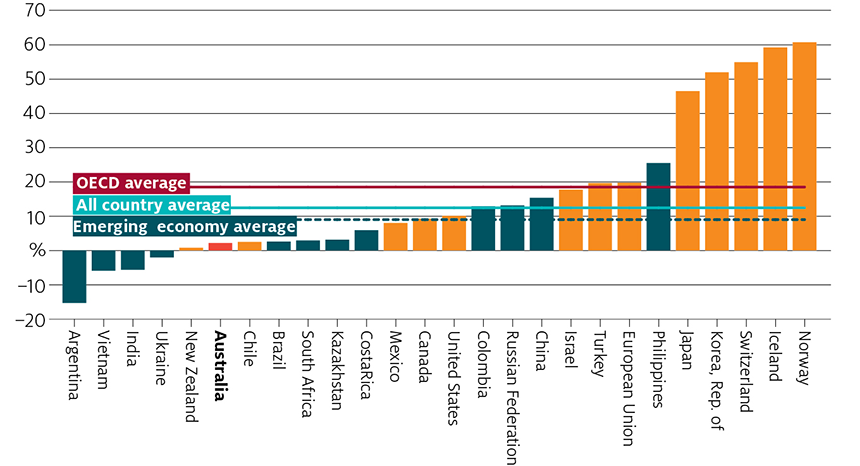Global S&T Development Trend Analysis Platform of Resources and Environment
| Lower subsidies equals stronger agriculture, according to ABARES analysis | |
| admin | |
| 2020-05-29 | |
| 出版年 | 2020 |
| 国家 | 澳大利亚 |
| 领域 | 资源环境 |
| 英文摘要 | Author: Jared Greenville SummaryAustralia has one of the lowest levels of support
Source: OECD Australian farmers are some of the least subsidised in the world – second only to New Zealand in terms of countries where comparable information is available. As measured by the OECD, just over 2% of Australian farmer revenues in 2016-18 were derived from government support. Globally, Norway (61%), Iceland (59%) and Switzerland (55%) in Europe, and Korea (52%) and Japan (46%) in Asia, provide the highest levels of agricultural subsidies. Australia has reformed its approach to agricultural support over time, in line with national competition policy and other pro-competitive reforms and consistent with WTO obligations. Government support is now dominated by investments in sector capacity, such as R&D. Where direct farm support is provided, it is concentrated on risk management tools to help manage Australia’s uniquely variable climate. These tools include Farm Management Deposits and income tax smoothing. Keeping subsidies low is important for both Australian producers and international markets. Australia’s reform experience shows that deregulating the agriculture sector and removing distorting forms of support spurs overall sector growth, increasing participation in global markets and the contribution that agriculture makes to the rural and national economy. Current global levels of production and trade distorting support mean that global agricultural production and trade is lower than it could be and households are worse off. For Australia alone, estimates suggest that global subsidies and trade barriers could be costing Australian agriculture between $8 billion to $10 billion in exports annually (Anderson and Valenzuela 2020; Greenville et al. 2019c). In recent years, with little progress at the WTO, global reductions in the level of production and trade distorting support have stalled. In fact, average levels of support across the OECD and emerging countries have been stable to rising. This trend has the potential to worsen with the introduction of some measures in response to the COVID-19 pandemic. All governments have an interest in keeping agricultural markets free from distortions to promote global food security and contribute to rural development. Governments do need to make investments in agriculture to help meet global development goals, but it is important that these investments not harm producers elsewhere. Furthermore, the impact of rising levels of support have disproportionately larger negative impacts on the countries that implement those policies than on others. Future trade rules will be needed to help guide policy actions so they do not harm producers in other countries and to avoid an erosion of the past gains from freer agricultural markets made since the WTO Agreement on Agriculture came into effect. Download the reportAnalysis of government support for Australian agricultural producers PDF [1.71 MB] Analysis of government support for Australian agricultural producers DOCX [4.88 MB] |
| URL | 查看原文 |
| 来源平台 | Australian Bureau of Agricultural and Resource Economics and Sciences |
| 文献类型 | 科技报告 |
| 条目标识符 | http://119.78.100.173/C666/handle/2XK7JSWQ/271767 |
| 专题 | 资源环境科学 |
| 推荐引用方式 GB/T 7714 | admin. Lower subsidies equals stronger agriculture, according to ABARES analysis,2020. |
| 条目包含的文件 | 条目无相关文件。 | |||||
| 个性服务 |
| 推荐该条目 |
| 保存到收藏夹 |
| 查看访问统计 |
| 导出为Endnote文件 |
| 谷歌学术 |
| 谷歌学术中相似的文章 |
| [admin]的文章 |
| 百度学术 |
| 百度学术中相似的文章 |
| [admin]的文章 |
| 必应学术 |
| 必应学术中相似的文章 |
| [admin]的文章 |
| 相关权益政策 |
| 暂无数据 |
| 收藏/分享 |
除非特别说明,本系统中所有内容都受版权保护,并保留所有权利。
修改评论